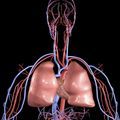Text to go here...
 Delivering genes to specific cells which cause the lung disease emphysema could be key to alleviating breathing difficulties, research on mice suggests.
Delivering genes to specific cells which cause the lung disease emphysema could be key to alleviating breathing difficulties, research on mice suggests.
A genetically inherited type of emphysema known as Alpha-1 anti-trypsin deficiency is often caused by a mutation in the Alpha-1 anti-trypsin gene. This mutation affects young people, making them susceptible to emphysema at an early age. Cells called Alveolar Macrophage (AM) cells, found in the lungs, have also been identified as contributors to the disease.
A team of researchers decided to study mice with this mutation and targeted AM cells for gene therapy. After one treatment, mice were able to express the Alpha-1 antitrypsin, which eased symptoms of emphysema. This improvement was sustained and the mice did not need repeated therapy. The AM cells which carried the therapeutic gene survived for a lifetime of two years.
Emphysema is a lung condition which causes shortness of breath. Damage to the structure of the lungs occurs over a gradual period. As a result parts of the body do not receive enough oxygen, causing fatigue and weight loss. Smoking is one of the main causes of the disease in the UK.
The research challenges the commonly held view of AM cells being short lived and therefore not relevant to gene therapy. The scientists would like to do more research and hope it will be useful for human treatments.
Last edited: 11 January 2022 09:21




